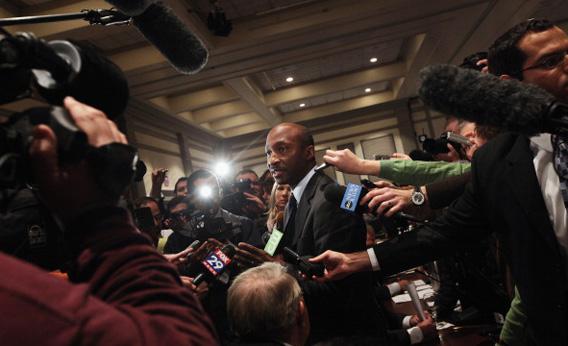Much remains unknown about the extent of the alleged child abuse by Penn State’s former football coach, Jerry Sandusky, and about how long and how much university officials knew of it. If past scandals are any guide, Sandusky’s alleged abuse claimed more than the eight victims identified by the grand jury investigation. (The New York Times reports today that police are working to confirm allegations by “close to 10” more suspected victims who have contacted authorities since Sandusky’s arrest on Nov. 5.) As each additional victim’s story become known, more attention will be focused on the question of why Penn State officials didn’t do more to stop the alleged sexual predator in their midst.
Late last week, the university’s trustees announced they would conduct their own “full and complete” investigation into the matter. The probe will be headed, though, by a man with a track record of protecting powerful institutions from the consequences of their inaction: the chairman and CEO of the Merck pharmaceutical company, Kenneth C. Frazier. A Penn State alum and Harvard-trained lawyer, Frazier is best known for his phenomenal success in defending a sordid chapter in Merck’s recent past—its years-long silence about the safety problems of the popular painkiller Vioxx.
For most of the five-and-a-half years it sold Vioxx, Merck knew the drug doubled the risk of cardiovascular problems among users, but it did not tell doctors or patients. Instead, it pursued an active disinformation campaign—telling doctors that Vioxx was safer for the heart than older painkillers (it was not), squashing university scientists who dared to dissent, and withholding clinical trial results that would have definitively proven Vioxx’s risks to federal regulators. In late 2004, after the weight of the evidence became impossible to deny, Merck abruptly pulled Vioxx from the market.
There are parallels between the situations at Merck and Penn State. Merck had a legal duty to warn patients that Vioxx could cause heart attacks, and Penn State had at the very least an ethical duty to tell police that Jerry Sandusky may be a pedophile. Neither institution fulfilled its responsibilities, with devastating consequences for those on the outside. According to research published in the Lancet, a British medical journal, Vioxx caused between 88,000 and 140,000 cases of serious heart disease in the United States before Merck withdrew the drug in 2004. Roughly one-half those cases ended in death. We know that Penn State’s failure to alert police to the 2002 report of alleged rape enabled Sandusky to claim at least one additional victim in subsequent years. The boy, identified only as Victim 1 in the grand jury report, was 11 or 12 when he met Sandusky through the former coach’s charity in 2005 or 2006, and testified that Sandusky performed oral sex on him more than 20 times between 2007 and early 2008. The grand jury’s investigation was triggered when the boy blew the whistle on Sandusky in 2009.
Merck and Penn State have something else in common: Their failure to act creates substantial civil liability, and it is here that Frazier’s experience at Merck may be most useful to Penn State. As he showed with the Vioxx litigation, Frazier is adept at mounting a scorched-earth defense that minimizes payouts to potential plaintiffs.
Tens of thousands of former Vioxx users sued Merck after it withdrew the drug, alleging Vioxx had caused them to suffer heart attacks and strokes. Frazier, then the company’s general counsel, declared Merck had done nothing wrong and refused to settle. “We’ll fight every case,” he declared, and hired top-flight law firms in several East Coast cities, in the South, in Chicago, and Los Angeles, as well as a prominent New York firm to coordinate the overall strategy. It took three years and $2 billion in legal expenses for Frazier’s hard-nosed tactics to pay off. Merck settled in late 2007 for a relative pittance, resolving some 50,000 Vioxx cases for just under $5 billion. It was a far cry from the $25 billion to $50 billion in liability that analysts had predicted when Merck withdrew the drug.
Penn State’s potential liability is tiny by comparison. But the lawsuits are coming. The grand jury found Sandusky molested multiple children, and repeatedly, in the football team’s showers. University officials acknowledge they were told of two such incidents. It’s hard not to wonder if they received—and overlooked—other warnings or signs of trouble over the course of Sandusky’s 32-year coaching career. Answering those questions is Frazier’s charge, but the public is unlikely to learn the ugly findings.
As at Merck, so at Penn State: People looked the other way when they stumbled upon something they preferred not to see. They downplayed the import of what they knew. They deflected responsibility and they buried information. At Merck, they were protecting a multibillion dollar drug. At Penn State, they were protecting a football program that brings in $70 million per year, confers prestige on the university and supports jobs with important titles and big paychecks.
The university promises its current investigation will determine “what failures occurred, who is responsible and what measures are necessary to ensure that this never happens again.” But there is a terrible irony to their choice of Ken Frazier as its leader. Frazier, after all, rose to the top by burying monumental corporate failures at Merck. Those interested in learning the full and complete truth about what happened at Penn State have the right to be concerned that the cover-up of the cover-up has begun.
